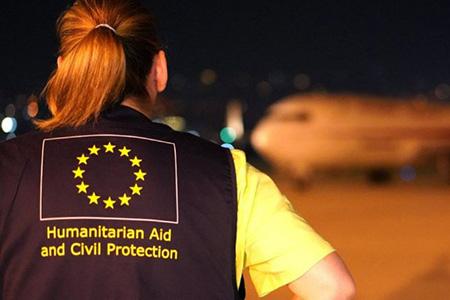
Today, Commissioner for Crisis Management Janez Lenarčič is in Armenia to coordinate the EU's assistance to the country in light of the mass exodus of people from Nagorno-Karabakh. This follows President von der Leyen's meeting with Prime Minister Nikol Pashinyan yesterday in Granada where a series of EU support measures were outlined. The visit comes as a plane carrying EU emergency supplies is due to arrive in Yerevan. The aid flight is part of the European Humanitarian Response Capacity which has been activated to provide support to humanitarian organisations on the ground.
Mobilising its humanitarian stockpiles, the EU is delivering hygiene kits, kitchen sets, blankets, solar LED-s, and solar flashlights to EU humanitarian partners who will then rapidly distribute them to the people in need. This aid flight will therefore help support people in need with shelter and accommodation essentials.
Furthermore, the Commissioner will discuss the latest support mobilised via the EU Civil Protection Mechanism which was activated on 29 September upon a request from Armenia. So far, Austria, Germany, Lithuania, Norway, Poland, Romania, and Sweden have offered urgently needed shelter equipment and food and medical supplies. Belgium, Bulgaria, France, Italy, Luxembourg, Spain, and Sweden have offered medical support to assist the mass burn victims of the fuel depot explosion in Stepanakert. The first medical evacuation flight transporting patients for treatment in France landed yesterday in Paris.
A team of EU humanitarian experts have been deployed to Armenia where they are now coordinating with humanitarian partners to assess the developing needs and to ensure a rapid response to the crisis. The EU's Emergency Response Coordination Centre is operating 24/7 to coordinate donations via the EU Civil Protection Mechanism to Armenia.
During his mission, the Commissioner will meet the Prime Minister of Armenia, Nikol Pashinyan; the Deputy Prime Minister, Tigran Khachatryan; the Minister of Foreign Affairs, Ararat Mirzoyan, as well as EU humanitarian partners in Armenia. Commissioner Lenarčič will also visit shelters for the displaced from Nagorno-Karabakh.
Background
In the past weeks, the EU has already allocated over €10 million in humanitarian aid in response to the crisis. The priority is to provide cash assistance, shelter, food security, and livelihoods, as well as mental health and psychological support to the refugees from Nagorno-Karabakh.
Since the outbreak of the Nagorno Karabakh war in 2020, the European Commission has allocated €31.2 million overall in humanitarian aid to provide emergency support to the affected people. EU humanitarian assistance includes food, hygiene, and household items, multi-purpose cash assistance, shelter, education in emergencies, health and psychosocial support, medical equipment, and other urgent assistance.
EU humanitarian funding is provided in line with the humanitarian principles of humanity, neutrality, impartiality, and independence.
For more information:
EU humanitarian operations in Armenia and Azerbaijan
Quote(s)
Almost the entire Armenian population of Nagorno-Karabakh has now fled to Armenia. We are mobilising our humanitarian stockpiles to deliver urgently needed shelter equipment to the displaced people. A flight with EU humanitarian cargo is landing in Yerevan. I also want to thank the EU countries that offered in-kind assistance to Armenia via the EU Civil Protection Mechanism. We stand in solidarity with those who have had to leave their homes and lives behind.
Janez Lenarčič, Commissioner for Crisis Management - 06/10/2023
Details
- Publication date
- 6 October 2023
- Author
- Directorate-General for Neighbourhood and Enlargement Negotiations
